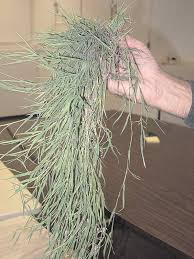GM grass invades Oregon—Scotts not responsible for cleanup
By Surya Zeeb
Published: August 4, 2018
Category: The Organic & Non-GMO Report Newsletter, Negative GMO Impacts

Genetically modified bentgrass is growing wild in Orgeon. Photo courtesy of Beyond Pesticides
It was an uninvited guest, but one that won’t ever leave. Genetically modified creeping bentgrass is causing irrigation problems for farmers and could contaminate non-GMO crops and natural forests and grasslands.
Scotts Miracle-Gro and Monsanto engineered the grass as Roundup Ready turfgrass for golf courses—and while waiting for deregulation, Scotts planted large fields for seed production in Idaho and Jefferson County, Oregon. Windstorms in 2013 spread the seeds as far as 13 miles, fertilizing conventional bentgrass plants. In 2015, the USDA proposed a deal—without input from locals: Scotts no longer had to fund cleanup efforts as long as it didn’t market the GM grass.
Carol Mallory-Smith, weed scientist at Oregon State University, warned the USDA’s APHIS that allowing seed fields was “tantamount to deregulation.” Scotts was fined $500,000 for negligence—while the GM grass spread. If Roundup loses effectiveness on conventional bentgrass, natural areas are at risk. “This is not about GMOs,” said Jerry Erstrom, a retired Bureau of Land Management natural resource specialist. “It’s about accountability.” With USDA’s weak regulatory guidelines, Mallory-Smith worries that crops more dangerous than bentgrass could slip through.
The GM grass was deregulated in January 2017; it is now classified as a noxious weed, with landowners required to remove it.
Source: High Country News
To view full article, visit:
https://www.hcn.org/issues/50.11/plants-genetically-modified-grass-creeps-across-eastern-oregon




